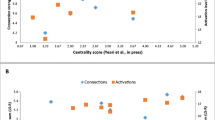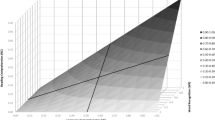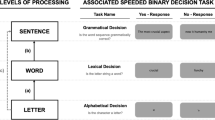Abstract
Reading performance and performance in a schematic concept formation task involving stimuli resembling physical configurations of words were examined in a college sample of initially poor and initially good readers. The initial level of reading performance was more related to the individual’s subsequent performance in the concept formation task than to rate of progress in reading performance. The results appeared sufficient to support further investigation into the nature of processes common to performance in both tasks. Various methodoligical advantages of a schema theory approach to the reading process are discussed.
Similar content being viewed by others
References
BROWN, B. R., & EVANS, S. H. 1969. Perceptual learning in pattern discrimination tasks with two and three schema categories. Psychonomic Science, 15, 101–103.
Cooperative Reading Test (Cort). 1960. (Part of the Cooperative English Test) Princeton: Educational Testing Service, Cooperative Test Division.
DANSEREAU, D. F., FENKER, R. M., & EVANS, S. H. 1970. Visual pattern perception; encoding and storage of schematic versus random patterns. Proceedings, 78th Annual Convention, APA, 49–50.
DIACK, H. 1963. Reading and the psychology of perception. London: Ray Palmer.
Diagnostic Reading Test (Drt). 1961. Committee on Diagnostic Reading Tests, Inc., Frances Oralind Triggs, Chairman. Mountain Home, N. C: The Committee on Diagnostic Reading Tests.
EDMONDS, E. M., EVANS, S. H., & MUELLER, M. R. 1966. Learning how to learn schemata. Psychonomic Science, 6, 177–178.
EDMONDS, E. M., & MUELLER, M. R. 1966. The role of schemata in perceptual learning. Psychonomic Science, 8, 239–240.
EDUCATIONAL DEVELOPMENTAL LABORATORIES FILMSTRIPS (EDL). 1963. Controlled Reading Study Guide. S. E. Taylor & H. Frackenpohl (Eds.) Huntington, N. Y.: Educational Development Laboratories.
EVANS, S. H. 1967a. A brief statement of schema theory. Psychonomic Science, 8, 87–88.
EVANS, S. H. 1967b. Vargus 7: Computed patterns from Markov processes. Behavioral Science, 12, 323–349.
EVANS, S. H., & ARNOULT, M. D. 1967. Schematic concept formation: Demonstration in a free sorting task. Psychonomic Science, 9, 221–222.
EVANS, S. H., & MUELLER, M. R. 1966. Vargus 9: Computed stimuli for schema research. Psychonomic Science, 6, 511–512.
GIBSON, D. J. 1965. Learning to read. Science, 148, 1066–1072.
HOLLIER, J., & EVANS, S. H. 1967. Schematic concept formation with lingua-form patterns. Psychonomic Science, 9, 89–90.
LANE, S. H. 1968. Preference for complexitv as a function of schematic orderliness and redundancy. Psychonomic Science, 13, 209–210.
LANE, S. H., & EVANS, S. H. 1968. Judged complexity as a function of schema related variables. Psychonomic Science, 11, 45–46.
McCREARY, A. P., & SURKAN, A. J. 1965. The human reading process and information channels of communication systems. Journal of Reading, 8, 363–372.
ROSSER, E. M. 1967. Categorization and discrimination of tone sequences. Unpublished doctoral dissertation, Harvard University.
SHIELDS, R. V., GORDON, M. A., & EVANS, S. H. 1969. Schematic concept formation in relationship to mental ability in adolescents. Psychonomic Science, 17, 361–362.
SHIPSTONE, E. J. 1960. Some variables affecting pattern conception. Psychological Monographs, 74, 42–60.
Author information
Authors and Affiliations
Additional information
This research was partially supported by the Department of Defense, Project THEM IS, Contact (DAAD05-68OC-0176), under the Department of the Anny grant to the Institute for the Stud of Cognitive Systems through the Texas Christian University Research Foundation.
Rights and permissions
About this article
Cite this article
Lane, S.H., Evans, S.H. & Lane, C.A. A Schema Theory Approach to the Reading Process. Psychol Rec 24, 75–80 (1974). https://doi.org/10.1007/BF03394217
Published:
Issue Date:
DOI: https://doi.org/10.1007/BF03394217




